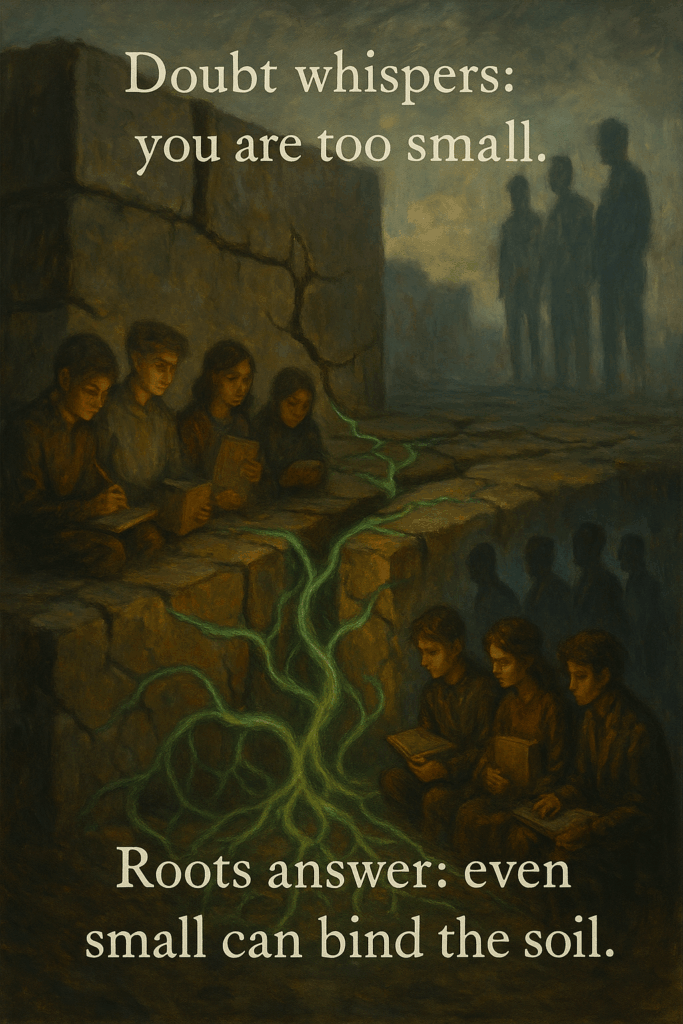
The greenhouse felt smaller under November’s early dusk, its patched glass fogged with the breath of the Circle of Seeds. Emil sat at the scarred table, the UN Youth Forum email open on the laptop: Virtual session confirmed, December 15. Present East Riverton’s story. Global youth await. The seedling tray—basil and beans now rooted in their pots—stood as a quiet witness, their leaves curling against the chill.
Priya paced, her notebook filled with sketches of mural boards and quiet boxes. “Geneva? We’re kids from Crestview, not diplomats. What if we stutter? What if they laugh?”
Aisha, her paint-streaked sleeves rolled up, leaned against the wall. “My forum’s up to twenty-five students, sixty entries. Crestview’s mural has a fourth panel now—Red Jackets and Eastsiders painting together. But that’s a school, not a world. Wars don’t stop with three-minute circles.”
Jaden, his welder’s apron dusted with rust, grunted. “And Marco’s at it again—whispering we’re in over our heads. Says the UN’s a trap, like the council’s oversight.”
Mina clutched a new quiet box design, her voice soft. “He’s right about one thing. We need to prepare. What do we emphasize? East Riverton’s fifteen percent drop? The mural’s bridge? Or the slips that said ‘trust feels like a trap’?”
The group chat buzzed with support: Westfield offered canopy videos, Northwood sent ledger templates. But a message from a Crestview student echoed Marco: What if the UN twists our words?
Emil felt the basil leaf in his pocket, its edges worn. “We’ve faced storms before—whispers, fires, cuts. This is just a bigger one. But we can’t go in blind. Let’s graft our strengths—local roots, global voice.”
They spent the week preparing. Priya drafted the presentation: slides of East Riverton’s mural (cracks turned to bridges), quiet box slips (raw truths anonymized), data charts showing the fifteen percent drop. Aisha practiced her speech, weaving Crestview’s cliques into East Riverton’s gangs: “Red Jackets fought for fairness, Eastsiders for order. We grafted them. Now, East Riverton’s red and black tags become shared stories.”
Jaden built a virtual model of the canopy, showing how it sheltered circles. Mina curated quiet box entries, highlighting unheard cries: “Jobs, not promises.” Emil tied it to the Four Absences, preparing for doubt: “Global wars dehumanize like labels in our streets—‘gangs’ or ‘enemies.’ Ledgers restore voices.”
But doubts crept in. At a practice run, Aisha faltered. “What if they see us as naive, like Hargrove did?” Priya nodded. “Or worse—what if our roots don’t stretch that far?”
That night, Emil called Grandfather Tomas, the greenhouse lamps flickering like stars. “Grandfather, the UN wants us to speak. But the walls feel high—doubts, distance, wars. How do we speak beyond them?”
Tomas leaned on his stick, his voice a steady root. “Walls are illusions, Emil. They seem tall because we stand alone. But roots know no walls—they weave beneath, connecting what seems divided. Speaking beyond walls isn’t shouting over them; it’s sharing the soil. Tell your story as it is—fragile sprouts in cracked ground. Let them see the roots you’ve grafted: Crestview’s cliques, East Riverton’s gangs. They’ll feel the strength in what bends, not breaks.”
Emil exhaled, the basil leaf’s scent filling the air. “And if they don’t listen?”
“Then you’ve planted anyway. Roots follow no map—they find their way.”
A New Question
The next evening, as they rehearsed, Mina read aloud one of the slips from East Riverton: “Trust feels like a trap.” Another, written in hurried script, said: “I just want to walk home safe.”
The room fell silent.
Emil leaned forward. “If trust feels like a trap, it means institutions only show up with punishment, not protection. What if part of our proposal is how they could change that?”
Priya’s eyes widened. “Police don’t need to be only enforcers of law. They could be teachers of community life—character builders.”
Aisha tapped her brush against the table. “They could sit in circles, not to arrest, but to guide. Talk to us about what names do—how calling someone ‘gang’ or ‘trash’ poisons the soil. Teach us to see rumors and fake news as weeds before they spread.”
Jaden gave a crooked grin. “So instead of just tickets and patrol cars, they’d help us stop bad habits before they harden into crimes.”
Mina’s voice steadied. “That’s what safety would feel like—not just fewer crimes, but fewer reasons for them in the first place.”
They decided to weave this into their presentation’s close: not just ledgers and murals, but a vision of institutions as gardeners too—police, teachers, leaders—guiding the soil, not only pruning branches.
That night, Priya wrote in the ledger under the south lamp.
Ledger Entry — Beyond the Walls
Date: December 1
Symptom: Doubts rise as UN forum nears; whispers question roots.
Disease — The Four Absences (Global):
-
Absence 1 (Exclusion): Distance locks out voices, like cliques isolating rivals.
-
Absence 2 (Vengeance): Skepticism punishes hope, like Marco’s warnings.
-
Absence 3 (Dehumanization): Youth seen as “naive,” not keepers.
-
Absence 4 (Unheard Cry): Global needs ignored amid doubt.
Investigator’s Response: Grafted presentation—East Riverton’s data, Crestview’s mural, quiet boxes. Practiced mirror sessions; emphasized roots over perfection. Proposed institutions evolve into gardeners—preventing harm by teaching dignity, dialogue, and discernment.
Outcome: Doubts woven into strength; forum ready.
Note: Walls divide above ground; roots connect below. Speak beyond them, and the forest follows.
The greenhouse’s hum deepened, the seedling tray a quiet promise. The UN forum loomed, a wall that felt less imposing now—roots already weaving beneath.
After Priya closed the ledger, the Circle sat in silence, the greenhouse hum steady around them. Mina lingered, her quiet box slips still in her lap. She pulled out her own small notebook, its cover worn soft from use, and wrote in her careful hand:
“If whispers can cross walls, maybe voices can too. I will carry them.”
She closed it gently, slipping it back into her bag. No one else saw, but her words joined the roots weaving beneath the walls.

